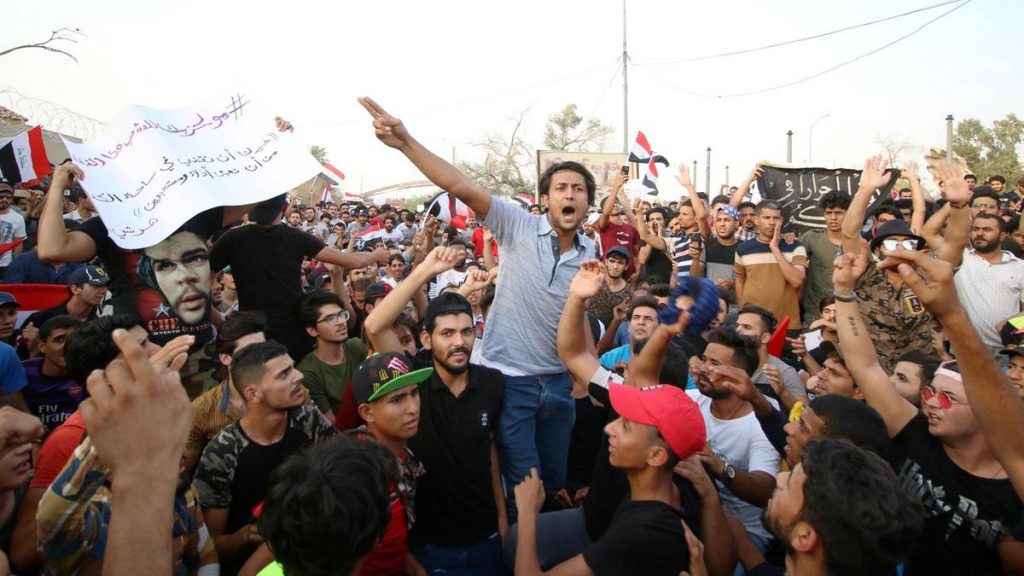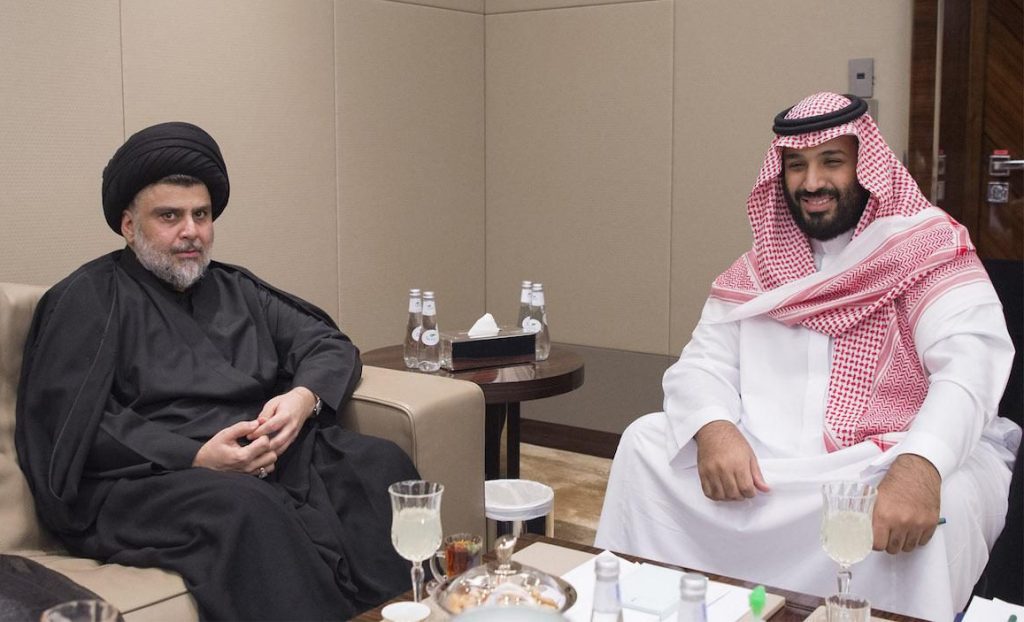Australia/Israel Review
Iraq astir, Iran at bay
Aug 3, 2018 | Amotz Asa-El

Iraq is astir. Clashes between demonstrators and security forces that began on 10 July in the southern metropolis of Basra soon spread 80 kilometres northwest, to the sacred city of Najaf, before travelling a further 100 kilometres north, to Baghdad. Within seven days, the unrest left at least eight demonstrators dead.
The rioting began in the oil-rich, predominantly Shi’ite south, where Shi’ite Iran’s influence over residents in its western neighbour was both natural, and often welcome, following the downfall of Saddam Hussein’s regime 15 years ago.
Yet that pro-Iranian sentiment is being challenged and disputed in what looms as another blow for Teheran’s regional designs, symbolised by a mob torching of a huge placard of Ayatollah Khomeini in Basra on July 16.
More practically, demonstrators disrupted Iraq’s main economic lifeline by blocking Basra’s cargo port, through which Iraq exports more than three million barrels of oil every day. At the other end of the petroleum production cycle, rioters marched on the West Qurna 1, West Qurna 2 and Rumaila oil fields and on the Siba gas field, threatening to bring production to a standstill.
Back in Basra, riot police fired gunshots and tear gas at rioters who had laid siege to city hall and torched the headquarters of several Iranian-backed political parties. Further to the south and east, border crossings to Kuwait and Iran had to be shut down after protesters crowded the roads approaching them.
Meanwhile, a mob closed in on a courthouse in Samawah – a city of 150,000 halfway between Basra and Baghdad – when gunshots from an unidentified source cracked out, leaving two rioters dead. To the northwest, in Najaf, demonstrators approached the airport, Iraq’s second most active, paralysing it for several hours, while others set fire to the local offices of the ruling Dawa Party.
With demonstrations reaching Baghdad, the government blocked internet access hoping to prevent the use of social networks to fan the protests. This drastic measure quickly backfired, demonstrations only intensified, and internet connectivity was restored.
Ten days on, with hundreds reportedly arrested, no one can predict how and when the unfolding unrest might end. Its social and economic causes, however, are clear, as are also their political context and implications.
Southern Iraqis are angry that the petrodollars their region produces haven’t trickled down to their daily lives.
The wells under their feet produce 70% of Iraq’s oil, which in turn accounts for 95% of Iraqi exports. Yet power and water supplies throughout the region frequently falter, drying faucets and turning off refrigerators and air conditioners during a season when daytime temperature habitually exceeds 40°C.
Worse, university graduates are frequently jobless while the profits of the oil wealth go to the foreign companies that pump it; to the thousands of foreign workers they employ; to the Government officials who collect the foreign firms’ taxes, and – according to Haaretz’s Arab affairs expert Zvi Bar’el – to tribal leaders who blackmail the foreign companies. Little is left for the millions who are not part of this food chain.
Understandably, then, 15 years after Saddam’s departure, many Iraqis are frustrated that their lot has not improved.
This is the backdrop against which Shi’ite cleric and militia leader Muqtada al-Sadr has been inciting the Iraqi masses to oust the Iranian-backed government.
Bolstered by a million-person rally in Baghdad’s Tahrir Square in winter 2016, al-Sadr’s anti-corruption campaign bore political fruit on May 12, when a coalition of parties allied to him won 54 of the Iraqi parliament’s 329 seats; not a critical mass, but more than any other coalition.

Muqtada al-Sadr meets with Iran’s arch-rival, Saudi Crown Prince Mohamed bin-Salman, in 2017
The charismatic, 45-year-old al-Sadr is bad news for Iran much the way he was for the US when he incited the guerrilla attacks its troops faced last decade.
Having traveled a year ago to Iran’s arch-rival Saudi Arabia where he met with the Ayatollahs’ nemesis, Crown Prince Mohamed bin-Salman, al-Sadr then ordered his followers to remove anti-Saudi propaganda from Iraq’s streets.
All three moves – the journey, the meeting, and the decree – were blatantly anti-Iranian statements that both reflected and reinforced a growing impatience with Teheran’s domination of Iraqi politics.
For its part, Iran is now scrambling to arrange for an alternative coalition in Baghdad that would sideline al-Sadr in Iraq’s fragmented parliament. The unrest in the streets indicates that such a coalition, even if it materialises, will likely be futile as a matter of practical politics. Iran has lost the trust, respect, and fear of too many Iraqis.
The demonstrators’ demands for water, electricity, and jobs followed an Iranian decision to cut off an electricity supply conduit from the Islamic Republic to Iraq on 6 July.
The Iranian regime was compelled to cut off the power it was providing Iraqis in the face of intensifying international sanctions, but these constraints on Teheran are of little interest to the Iraqi sitting jobless in a dark apartment with no running water.
As he sees things, Teheran and its protégés had more than a decade in which to give him a better life, but life only got worse. This is doubly so for al-Sadr, who started off as an anti-Saddam activist and matured as an anti-American warrior.
Enjoying the unequivocal support of 88-year-old Iraqi Shi’ite spiritual leader Ayatollah Ali al-Sistani, al-Sadr’s rising power is already impacting the policies of the government in Baghdad.
Al-Sadr did not run in the recent election, apparently because he prefers to call the shots from outside thus enjoying the benefits of maximum authority and minimum responsibility. However, the caretaker government of Haidar al-Abadi has already made an effort to follow al-Sadr’s example, sending its Electricity Minister to Riyadh in order to sign a deal that will bring Saudi electricity into the Iraq grid.
The shift in Iraq’s source of power is symbolic. After several years of Persian tutelage, Iraq is returning to the Arab fold.
From Teheran’s point of view, the unrest in Iraq is but one detail in the broader crisis of an embattled imperial project.
Back in the days of Ayatollah Khomeini, the project was limited to Syria and Lebanon, with the mullahs enjoying the backing of Syria’s non-Sunni President Hafez Assad in their war with the Sunni Saddam Hussein’s Iraq, while also cultivating Lebanon’s Shi’ites as an anti-Israeli avant-garde.
The American democratisation of Iraq after 2003 effectively handed it over to the Shi’ite majority, which in turn aligned Baghdad with Iranian patronage. The Syrian civil war then saw the Iranians use their dominance in Iraq to nurture there a system of militias that could be used by Teheran to support Bashar al-Assad in his country’s civil war.
West of Syria, Iran’s imperial efforts were bolstered by Hezbollah’s growing domination of Lebanese politics. Finally, Iran entered the Yemeni civil war by siding with the Shi’ite-led Houthi rebels against the Saudi-backed government of Abdrabbuh Mansour Hadi.
How far this expansionist imperial project was meant to reach is anyone’s guess. Saudi Crown Prince bin-Salman last year accused Teheran of striving “to control the Islamic world.” Whatever its rationale, the project is now challenged on multiple fronts:
In Yemen, a Saudi-led counterattack earlier this year has put Iran on the defensive. In Syria, Russia’s intervention in 2015 first stole Iran’s thunder by handing the Assad regime the victory Iran could not deliver; then Russia obstructed Teheran’s quest to build a strategic foothold on Syria’s Mediterranean coast; and then finally Russia stood by while Israel’s air force repeatedly attacked Iran’s Syrian bases.
Now the Iraqi unrest multiplies these setbacks.
Sadr’s hostility to Teheran’s foreign policy is not confined to what Iran is doing in Iraq. By calling last year on Bashar Assad to resign after charging him with responsibility for massive bloodshed of the Syrian civil war, Sadr effectively confronted Iran’s entire Middle Eastern strategy, of which the Assad dynasty has been a lynchpin.
Sadr will not decide Assad’s fate, and he may also not decide Iraq’s. However, he may well determine the outcome of its Iranian misadventure – if he hasn’t done so already.






